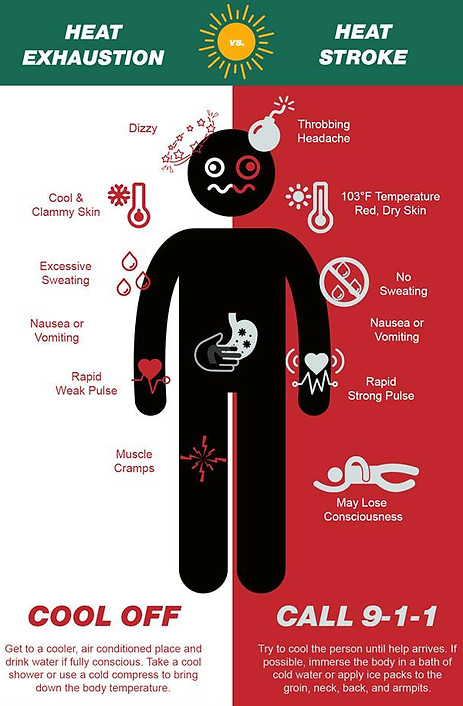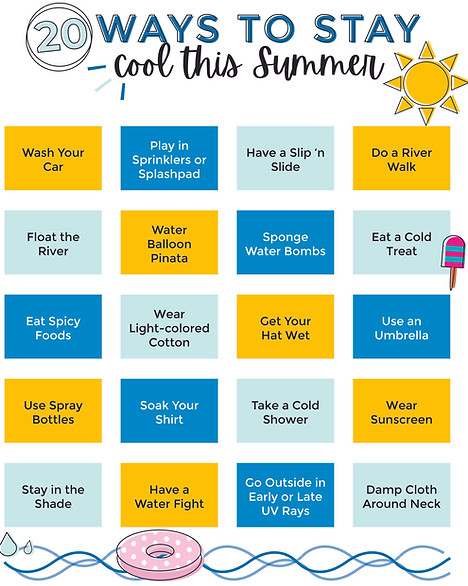Extreme Heat
Air temperatures >90 degrees + high humidity = a high heat index and reduced air quality, making it feel even hotter than the thermometer reading. Extremely hot, humid conditions cause over 1,000 US fatalities each year.
During the extreme heat common during Florida summers, heat-related illnesses like heat stroke can affect anyone. If you are pregnant or have a heart condition, asthma, or other chronic health condition, even short periods of exposure to extreme heat can make your health worse. Take breaks indoors and drink extra water. Public Libraries have air conditioning and are open to everyone!
To check local heat risks and air quality right now and for the coming week, enter your ZIP code on the CDC's real-time HeatRisk website.





Before
During
After
-
Be mindful of weather conditions and the Heat Index. Humidity makes it feel much hotter than the thermometer reading.
-
Understand the National Weather Service's extreme-heat-related terms.
-
Excessive Heat Watch: Get Prepared! Ihe risk of a heat wave has increased, conditions are favorable for an extreme heat event in the next 24 to 72 hours.
-
Heat Advisory or Excessive Heat Warning: Take Action! The heat index is expected to be >100°F (Advisory) or >105°F (Warning) for at least two days and overnight temperatures will not drop below 75°F. If you don't take precautions, you could become seriously ill.
-
-
Take steps to keep yourself and your home cool during the hottest months:
-
Weather-strip doors and windows.
-
Cover windows with drapes or shades; during an extreme heat wave, temporarily putting aluminum foil-covered cardboard in the windows will reflect heat back outside.
-
Add insulation to keep the heat out.
-
Use a powered attic ventilator, or attic fan, to regulate the heat level by clearing hot air.
-
If the house doesn't have a central air conditioning system, install window air conditioners and insulate around them.
-
-
Everyone can be at risk for heat-related illness, but some more so than others.
-
Young children and infants are particularly vulnerable to heat-related illness and death, as their bodies are less able to adapt to heat.
-
Older adults, particularly those who take certain medications, are living alone, or have limited mobility can experience multiple adverse effects.
-
People who are overweight or have chronic medical conditions are more likely to have serious health problems during a heat wave.
-
Pregnant women are at higher risk for heat illness leading to adverse birth outcomes such as low birth weight, pre-term birth, and infant mortality, as well as congenital cataracts.
-
Pets like cats and dogs that go outdoors are at risk for heat illness, burned paws, and heat stroke - provide access to shade and plenty of cool water at all times. Only allow pets to walk in grassy areas - sand, rocks, asphalt, brick, stone, and concrete can quickly burn paw pads in the summer. (Place your palm on the surface for 5 seconds - if it feels hot to you, it's too hot for their paws.)
-
-
When the temperature is very high stay inside an air-conditioned building and take heat safety measures.
-
Drink more water than usual, and don’t wait until you’re thirsty to drink.
-
Limit the use of the stove and oven.
-
Do not use electric fans as the only source of cooling when the temperature is more than 95 degrees. Fans create air flow but will not reduce body temperature unless sufficient evaporation is taking place on the skin. This false sense of comfort can increase the risk of heat-related illness.
-
Take cool showers or baths to cool down.
-
If you must go outside, remember:
-
A hat to protect the head and face from the sun
-
Sunscreen - a sunburn makes it difficult for the body to cool down
-
Wear lightweight, light-colored, loose-fitting clothing
-
Limit outdoor activity to morning and evening hours; avoid outdoor exertion during the hottest times of the day
-
Pace yourself. Start activities slowly and pick up the pace gradually.
-
Take frequent breaks in the shade.
-
-
Check on vulnerable friends, relatives, and neighbors during the hot summer months, especially if they don’t have air conditioning.
-
Don’t forget pets! Animals are at risk of heat-related illness, too. Provide plenty of water and shade while outdoors, and consider wetting the animal down when temperatures soar.
-
Never leave children, pets, the elderly, or disabled persons in a vehicle.
-
Know the signs and symptoms of Heat Illness and what to do:
-
Heat Cramps: Heavy sweating and painful muscle cramps and spasms usually in the legs and abdomen
-
First Aid: Move to the shade or indoors. Apply firm pressure on cramping muscles or gently massage to relieve spasms. Give sips of water unless the person complains of nausea. Seek immediate medical attention if cramps last longer than one hour.
-
-
Heat Exhaustion: Heavy sweating, weakness, skin that is pale and clammy; fast, weak pulse; headache, muscle cramps, dizziness, nausea or vomiting, fainting.
-
First Aid: Move to a cooler environment, preferably an air-conditioned room. Loosen clothing. Apply cool, wet cloths to the skin or get into cool water. Offer sips of water. Seek immediate medical attention if the person vomits, symptoms worsen, or signs last longer than one hour.
-
-
Heat Stroke: Throbbing headache, confusion, nausea, temperature above 103°F; hot, red, dry or damp skin (sweating stops), rapid, strong pulse; dizziness, fainting.
-
First Aid: Call 9-1-1 and get medical assistance immediately. Delay can be fatal. Move into an air-conditioned environment and reduce body temperature; get into cool water or apply ice packs to the neck, armpits, and groin while waiting for emergency medical personnel.
-
-








